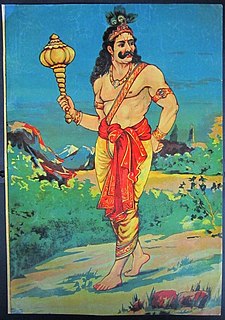
In Indian epic Mahabharata, Bhima is the second among the five Pandavas. The Mahabharata relates many events that portray the might of Bhima. Bhima was born when Vayu, the wind god, granted a son to Kunti and Pandu. After the death of Pandu and Madri, Kunti with her sons stayed in Hastinapura. From his childhood, Bhima had a rivalry with his cousins Kauravas, especially Duryodhana. Duryodhana and his uncle, Shakuni, tried to kill Bhima multiple times. One was by poisoning and throwing Bhima into a river. Bhima was rescued by Nāgas and was given a drink which made him very strong and immune to all venom.
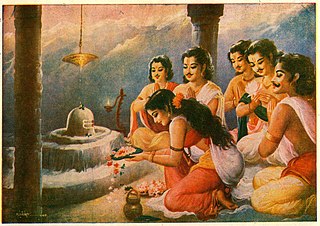
The Pandavas refers to the five brothers namely, Yudhishthira, Bhima, Arjuna, Nakula and Sahadeva, who are the main characters in the epic Mahabharata. They were the acknowledged sons of Pandu, the king of Hastinapur and his two wives Kunti and Madri. The five brothers shared a wife, Draupadi. The Pandavas waged war against their cousins Kauravas ; this was known as Kurukshetra War. The Pandavas won the war and the Kauravas lost.

Draupadi, also referred to as Krishna, Panchali and Yajnaseni, is the tragic heroine, one of the central characters and the common wife of the Pandavas in the Hindu epic, Mahabharata. She is described to be the most beautiful woman of her time and was prophesied to bring a major change in the future.

Duryodhana also known as Suyodhana, is a major antagonist in the Hindu epic Mahabharata and was the eldest of the Kauravas, the hundred sons of a blind king Dhritarashtra and queen Gandhari. Being the firstborn son of the blind king, he was the crown prince of Kuru Kingdom and its capital Hastinapura along with his cousin Yudhishtra who was older than him. Karna was Duryodhana's closest friend. Notably, Duryodhana, with significant assistance from Karna, performs Vaishnava Yagna when the Pandavas are in exile. Duryodhana used his greater skill in wielding the mace to defeat opponents. He was also an extremely courageous warrior and he was said to be a good ruler. Duryodhana's greed and arrogance were the two qualities said to lead to his downfall in the Mahabharata.

In Hindu mythology, Durvasa also known as Durvasas, was a legendary Rishi and the son of Anasuya and Atri. He was a great devotee of Lord Shiva and goddess Parvati. Known for his short temper, wherever he went, he was received with great reverence from humans and devas alike.

In the Hindu epic, the Mahabharata, Yudhishtira is the first among the five Pandava brothers. He was the son of the king Pandu of Kuru and his first wife, Kunti and was blessed to the couple by the god Dharma, who is often identified with the death god Yama. In the epic, Yudhishthira becomes the emperor of Indraprastha and later of Kuru Kingdom (Hastinapura).
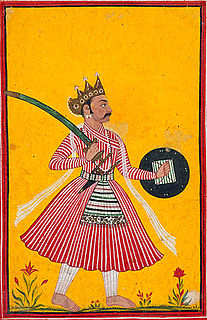
In the Hindu epic Mahabharata, Nakula was fourth of the five Pandava brothers. Nakula and Sahadeva were twins blessed to Madri, by Ashwini Kumaras, the divine physicians. Their parents — Pandu and Madri died early, so the twins were adopted by their step mother, Kunti and were trained by Drona in Hastinapur.
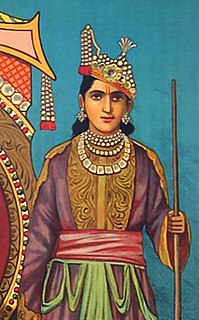
Sahadeva was the youngest of the Pandava brothers, the five protagonist of the epic Mahabharata. He and his twin brother, Nakula, were blessed to King Pandu and Queen Madri by the gods Ashvins. Sahadeva is described to be skilled in swordsmanship and astrology. During the Kurukshetra War, he killed many warriors including Shakuni.

In the epic Mahābhārata, Jayadratha was the king of Sindhu Kingdom. He was married to Dushala, the only sister of the 100 Kaurava brothers. Besides Dussala, he had another two wives, one from Gandhara and the other from Kamboja. He was the son of the king Vridhakshatra. He was killed by Arjuna with the help of Krishna. His son's name was Surath.

Akshaya Patra meaning inexhaustible vessel, is an object from Hindu mythology. It was a wonderful vessel given to Yudhishthira by the sun-god Surya which held a never-depleting supply of food to the Pandavas every day.

Akshaya Tritiya, also known as Akti or Akha Teej, is an annual spring time festival of the Hindus and Jains. It falls on the third Tithi of Bright Half of Vaisakha month. It is observed as an auspicious time regionally by Hindus and Jains in India and Nepal, as signifying the "third day of unending prosperity".
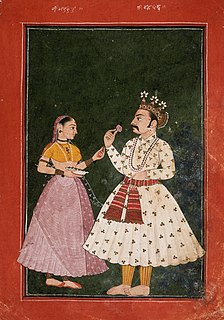
Kunti, also known as Pritha, is one of the most important female protagonists of the epic, Mahabharata. She is best known as the mother of the Pandavas, the main protagonists of the epic, and the warrior Karna, who was abandoned by her. She is also mentioned in the Bhagavata Purana because of her connection with Krishna, the main figure of the text. It is described that she was very beautiful and intelligent.

The Vana Parva, also known as the "Book of the Forest", is the third of eighteen parvas in the Indian epic Mahabharata. Aranya Parva traditionally has 21 sub-books and 324 chapters. The critical edition of Aranya Parva is the longest of the 18 books in the epic, containing 16 sub-books and 299 chapters.

Virata Parva, also known as the “Book of Virata”, is the fourth of eighteen books of the Indian Epic Mahabharata. also Virata Parva traditionally has 4 sub-books and 72 chapters. The critical edition of Virata Parva has 4 sub-books and 67 chapters.

Kalpeshwar is a Hindu temple dedicated to Shiva located at an elevation of 2,200 m (7,217.8 ft) in the picturesque Urgam valley in the Garhwal region of Uttarakhand state in India. The temple's ancient legend linked to the Pandavas, heroes of epic Mahabharata eminence is the fifth temple of the Panch Kedars of Shiva's five anatomical divine forms; the other four temples in the order of their worship are Kedarnath, Rudranath, Tungnath and Madhyamaheshwar temples; all in the Kedar Khand region of the Garhwal Himalayas. Kalpeshwar is the only Panch Kedar temple accessible throughout the year. At this small stone temple, approached through a cave passage, the matted tress (jata) of Lord Shiva is worshipped. Hence, Lord Shiva is also called as Jatadhar or Jateshwar. Earlier it was approachable only by 12 km (7.5 mi) trek from the nearest road head of Helang on the Rishikesh-Badrinath road but now the road goes up to Devgram village from where the trek now is just 300 metres. This road is good for bikes or cars with good ground clearance as it is half kuccha road which may get damaged during monsoons. Small cars can be taken except in monsoons.
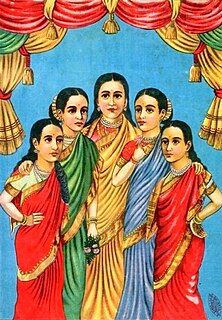
Panchakanya is a group of five iconic ladies of Hindu epics, extolled in a hymn and whose names are believed to dispel sin when recited. They are Ahalya, Draupadi, Kunti or Sita, Tara, and Mandodari. While Draupadi and Kunti are from Mahabharata, Ahalya, Sita, Tara and Mandodari are from the epic Ramayana.

Mahabharat is a 2013 Indian mythological television series based on the Sanskrit epic Mahabharat. It aired from 16 September 2013 to 16 August 2014 on Star Plus. The television show was produced by Swastik Productions Pvt. Ltd. The series was heavily criticised for several inaccuracies.
Kalakeyavadham is a Kathakali play (Aattakatha) written by Kottayam Thampuran in Malayalam.Based on the Mahabharatha, the play describes the events surrounding the Pandava prince Arjuna's visit to his father Indra's abode, paradise. The role of Arjuna is considered a challenge for any Kathakali actor. The four plays of Kottayam Thampuran, namely, Kirmeeravadham, Bakavadham, Kalyanasaugandhikam and Kalakeyavadham, are considered very important in the Kathakali repertoire and are a combination of conventional structure ('chitta') with intermittent possibilities for improvisation ('manodharma').
Bakavadham is a Kathakali play(Aattakatha) written by Kottayam Thampuran in Malayalam.Based on the Mahabharatha, the play narrates the events surrounding the escape of the Pandavas from the house of Lac which was built by the Kauravas as a trap. They escape to a forest where Bhima meets and marries Hidumbi. Following this, the Pandavas move to a village named Ekachakra, where they live in disguise. While in Ekachakra, Bhima slays Baka, a demon who has been terrorizing the countryside. The four plays of Kottayam Thampuran, namely, Kirmeeravadham, Bakavadham, Kalyanasaugandhikam and Kalakeyavadham, are considered very important in the Kathakali repertoire and are a combination of conventional structure('chitta') with intermittent possibilities for improvisation('manodharma').


















